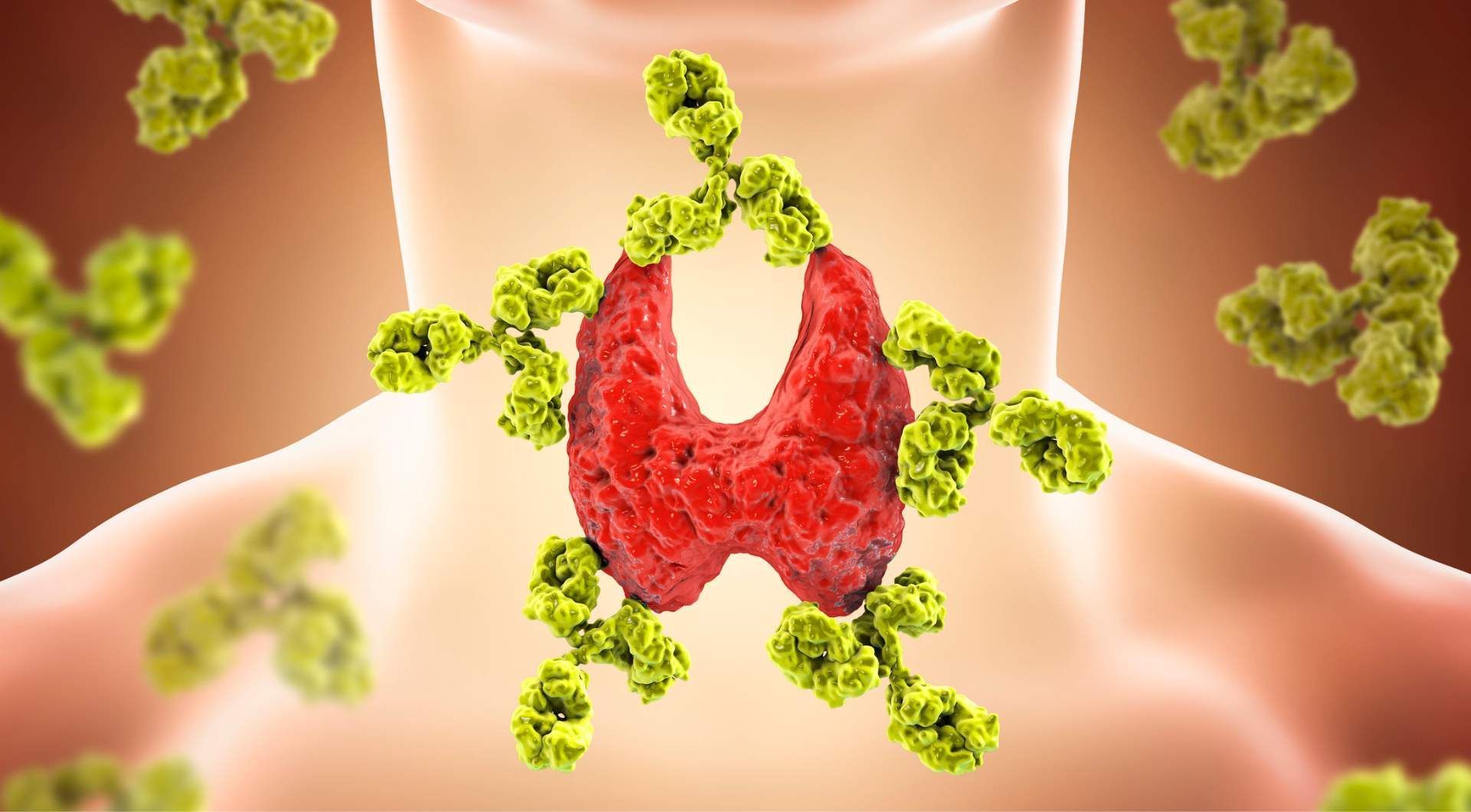Decoding the Thyroid Mystery: How To Diagnose Hashimoto's Disease
"The content below is not intended to be a substitute for professional medical advice, diagnosis, or treatment. Always seek the advice of your physician or other qualified health provider with any questions you may have regarding a medical condition."
You’re doing all that you can to achieve a healthy mind and body, but nothing is working. It’s frustrating to feel like your entire body is out of order and healing it is out of your control.
Have you considered that while you may be doing everything to take care of your body, your body may not currently be able to take care of you?
If you’re experiencing unexplained weight gain, extreme fatigue, irregular menstrual cycles, or a slew of other symptoms, you may be suffering from Hashimoto’s disease. And the first step to finding out if Hashimoto’s disease is affecting your life is receiving a diagnosis.
Read more to find out about how Hashimoto’s disease is diagnosed and what tests confirm Hashimoto’s disease.
Table of Contents
- What is Hashimoto’s Disease?
- Determining if You Have Hashimoto’s Disease: Getting Started With a Proper Diagnosis
- How Are Hashimoto's Symptoms Diagnosed?
- Is Hashimoto's Disease Hard To Diagnose?
- Why Is Hashimoto's Disease Sometimes Misdiagnosed?
- What Test Confirms Hashimoto's Disease?
- HealthierU: Using Holistic Nutrition To Help Our Patients Find Relief From Hashimoto’s Disease
What is Hashimoto’s Disease?
Hashimoto’s disease is an immune disorder affecting the thyroid’s ability to make and regulate thyroid hormones.
In people with Hashimoto’s disease, the immune system attacks the thyroid gland causing a large number of white blood cells to build up. As the white blood cells build, they damage the thyroid and affect its ability to produce thyroid hormones.
Without the ability to properly create thyroid hormones, patients with Hashimoto’s disease can develop hypothyroidism and, in some rare cases, hyperthyroidism. It is also possible to have Hashimoto’s disease without having hypothyroidism or hyperthyroidism.
The thyroid is a butterfly-shaped organ in the middle of your neck below your Adam’s apple. It produces hormones that regulate all parts of the body.
The biological functions that the thyroid is responsible for are:
- Metabolism
- Growth
- Weight
- Menstrual cycles
- Homeostasis
- Cholesterol
Hashimoto’s disease is the most common cause of hypothyroidism and the most common endocrine disorder in developed countries. This condition affects about 14 million patients in the U.S. and is most common among middle-aged women.
Other names for Hashimoto’s disease are:
- Hashimoto’s thyroiditis
- Chronic lymphocytic thyroiditis
- Autoimmune thyroiditis
Determining if You Have Hashimoto’s Disease: Getting Started With a Proper Diagnosis
The first step towards medical diagnosis is noticing that you have developed symptoms. Be sure to keep track of your symptoms and create a timeline for your doctor when symptoms worsen or new symptoms appear.
Common symptoms of Hashimoto’s disease are:
- Trouble regulating body temperatures (too hot or too cold)
- Fatigue
- Weight gain
- Muscle or joint pain
- Constipation
- Dry skin or thinning hair
- Irregular sleep cycle and insomnia
- Irregular menstrual cycles or fertility issues
- Confusion
- Slower heart rate
- Depression
If you are experiencing any of these symptoms, you could have Hashimoto’s disease.
Diagnosing your Hashimoto’s disease may be the first step towards taking back of your body and life. At HealthierU we take a holistic approach using nutrition as a tool that may help you ease your Hashimoto’s symptoms.
How Are Hashimoto's Symptoms Diagnosed?
Hashimoto’s symptoms are diagnosed through a physical exam and an examination of your medical history. If your symptoms and medical history raise any red flags for thyroid issues, your doctor may order blood tests to check for a thyroid disorder.
Blood tests your doctor might order could include:
- Thyroid-stimulating hormones (TSH) test
- Anti-thyroid antibodies (ATA) test
- Free thyroxine (Free T4) test
- Free Lythronine (T3) test
If the above-mentioned blood tests do not exhibit any antithyroid antibodies but a thyroid issue is likely present, your doctor may perform an ultrasound for additional confirmation.
Physical Exam and Medical History
A physical examination is the first step in the diagnosis of conditions that affect the thyroid, like Hashimoto’s. Your doctor will take your vitals and then check to see if you have developed a goiter.
Goiter is a condition where the thyroid gland becomes enlarged and may develop one or more bumps. It is an indicator that there is a thyroid issue present.
To detect the presence of a goiter, your doctor would feel along your neck where your thyroid is located and search for irregularities. The next step may be an assessment of your medical history.
Risk factors in your medical history that could indicate Hashimoto’s are:
- A family history of thyroid disease or autoimmune disorders
- A pre-existing autoimmune disorder
- Being a woman between the ages of 30 and 50
- The presence of
myxedema
Blood Tests
Blood tests may be necessary when diagnosing Hashimoto’s disease. Blood tests can measure the antithyroid antibodies and levels of thyroid hormones — both crucial factors in diagnosing Hashimoto’s disease.
Exact ranges for these values may differ from lab to lab depending on how accurately the lab can measure levels associated with the tests.
Thyroid-Stimulating Hormones (TSH)
A thyroid-stimulating hormone test, or TSH, is a blood test that measures the levels of thyroid hormones. TSH levels that are too high or too low may be an indicator of a thyroid issue. Lab results in patients diagnosed with Hashimoto’s often find high TSH readings.
Normal TSH values are between .5 to 5.0 mlU/L but in patients diagnosed with Hashimoto’s disease TSH values are 10.0 mlU/L or greater.
High TSH levels are not always an indicator of Hashimoto’s which is why other blood tests may be performed for diagnosis.
Anti-Thyroid Antibodies (ATA)
The anti-thyroid antibodies test (ATA) is a blood test that measures the presence of antibodies that are attacking your thyroid.
Anti-thyroid antibodies that are typically present for a Hashimoto’s diagnosis are:
- Thyroid peroxidase antibodies (TPO)
- Thyroglobulin antibodies (TGab)
The presence of ATAs is often associated with hypothyroidism caused by Hashimoto’s disease.
Free Thyroxine (Free T4)
A free thyroxine test is a test that measures the amount of free T4 in your blood. Thyroxine (T4) is a hormone produced in the thyroid gland. Free thyroxine (FT4) is thyroxine not attached to the protein in the blood so that it may enter tissues where it is needed.
Normal levels of free T4s in healthy adults are .5.4 to 11.5 mcg/dL. Any lower levels of FT4 accompanied by high TSH levels could be an indicator of Hashimoto’s disease.
T4s and T3s are thyroid-produced hormones that control metabolism. The low presence of free T4 along with high levels of TSH is an indicator of thyroid disease.
Free Triiodothyronine (T3)
Triiodothyronine (T3) is a hormone produced by the thyroid gland that is responsible for metabolic functions. Free triiodothyronine (FT3) is triiodothyronine not attached to protein in the blood, it has the same functions as FT4. FT3 levels are key in assessing thyroid function. High levels of FT3 may indicate hyperthyroidism while low levels of FT3 can indicate hypothyroidism.
Normal levels of FT3 in healthy adults are 260 to 480 pg/dL. Any levels outside of those ranges could indicate a thyroid issue like Hashimoto’s disease.
Ultrasound
Sometimes Hashimoto’s disease does not present antithyroid antibodies or irregular levels of TSH. In cases where your lab reading is normal but Hashimoto’s disease is still a suspect, your doctor may perform an ultrasound.
Physical attributes of Hashimoto’s disease that can be found by ultrasound are:
- Increased vascularity (blood flow)
- Pseudo nodules (lumps that disappear and reappear in a short period of time)
- Inflammation
- Presence of a goiter
Is Hashimoto's Disease Hard To Diagnose?
Hashimoto’s disease can be hard to diagnose. Studies have shown that hypothyroidism affects 5% of the world’s population, with Hashimoto’s disease being the most common cause. It is estimated that another 5% of the world’s population has an undiagnosed thyroid disorder.
With all these methods to achieve prognosis, why is Hashimoto’s disease misdiagnosed?
Why Is Hashimoto's Disease Sometimes Misdiagnosed?
Certain factors may lead to a misdiagnosis of Hashimoto’s disease, including:
- Symptoms: Symptoms of Hashimoto’s disease are broad and many other diseases can share similar symptoms. This may lead to Hashimoto's disease being mistaken for other diseases. Doctors may also simply write off Hashimoto’s as hypothyroidism.
- Stage of the disease process: Hashimoto’s disease is harder to diagnose in its early stages. In the early stages of Hashimoto’s disease, the thyroid is not as damaged and may be more functional than in later stages. Symptoms may be small and undetectable, but then later become more noticeable as the disease progresses.
- Test reference ranges: Pathology compares “normal ranges” of TSH (thyroid-stimulating hormones) and ATA (anti-thyroid antibody) levels to lab results. What may be considered “normal ranges” may be too broad, so it may be hard to detect Hashimoto's disease in a single lab result alone.
Some studies have shown that some labs may have pitfalls in the interpretation of test values. This could be due to inaccurate data or the exclusion of medical context when examining values.
What Is the Difference Between Hashimoto’s Disease and Hypothyroidism?
The terms ‘Hashimoto’s disease’ and ‘hypothyroidism’ may often be used interchangeably — the catch is they’re not the same thing.
Hashimoto’s disease is caused by the body’s immune system producing antibodies that attack the thyroid. This ‘friendly fire’ damages its tissues and reduces thyroid function causing hypothyroidism (and in rare cases, hyperthyroidism).
Hypothyroidism is the reduced function of the thyroid in producing thyroid hormones. Hashimoto’s disease is one of the most common causes of hypothyroidism, but it does not cause hypothyroidism in every case.
Hypothyroidism can be present without Hashimoto’s disease.
Other causes of hypothyroidism may be:
- Congenital hypothyroidism (hypothyroidism diagnosed at birth)
- Surgical removal of all or part of the thyroid
- Radiation treatment
- Iodine deficiency
- Some medications
What Test Confirms Hashimoto's Disease?
As mentioned above, a medical exam, medical history assessment, an ultrasound, and multiple blood tests could be necessary to diagnose Hashimoto’s disease. Hashimoto’s disease presents itself differently in each patient and the stage of the illness may make the disease more detectable.
The aforementioned blood tests that may be used to diagnose Hashimoto’s disease are:
- Thyroid-stimulating hormones (TSH) test
- Anti-thyroid antibodies (ATA) test
- Free thyroxine (Free T4) test
- Free Lythronine (T3) test
Remember that documenting your symptoms as they appear and progress could help your doctor when deciding what tests to order. Creating a timeline for your symptoms could also help you become more aware of when symptoms worsen or new symptoms appear.
Questions you may want to ask yourself regarding your symptoms may be:
- What are your symptoms?
- When did you notice these symptoms?
- Did the symptoms appear suddenly or progress over time?
- Have you had any big life changes recently?
- Have you noticed any changes in your mood and energy levels?
- Have you noticed any significant weight gain or loss in a short time period?
- What medicines or supplements are you taking?
- Have you noticed any changes in sleep, libido, or menstruation?
The more detail you can share about your symptoms, the easier it may be to diagnose the problem.
Treating Hashimoto’s Following a Diagnosis
Currently, the recommended medical treatment for Hashimoto’s disease is hormone replacement therapy in the form of a drug called levothyroxine.
Levothyroxine is used to supplement the thyroid’s inability to create thyroid hormones. It mimics thyroxine (T4) which is a thyroid hormone and a key player in regulating bodily functions. This treatment is taken orally, usually for life. Dosage may be adjusted throughout treatment.
Nutrition can be important when managing thyroid symptoms caused by Hashimoto’s disease.
Lifestyle changes may be needed to aid the efficacy of levothyroxine. Certain foods or supplements can interfere with the absorption of levothyroxine and may need to be avoided.
Foods to avoid consuming four hours before or after taking levothyroxine may be:
- Soy products
- High doses caffeine
- Walnuts
- Dietary fiber
- Calcium supplements
- Antacids
- Certain prescribed medications
Certain supplements can be taken to help the effectiveness of treatment and the management of symptoms. Nutrition is important when managing the symptoms caused by many diseases.
Supplements that can help manage symptoms caused by Hashimoto’s disease might be:
- Iron supplements
- Selenium supplements
- Vitamin D supplements
- Since supplements
- B12
- Probiotics
- Fish oil
- Foods rich in antioxidants
At HealthierU, Dr. Sergi is on a mission to help those diagnosed with thyroid issues like Hashimoto’s disease.
The role of nutrition and diet might play a more important role in aiding the treatment of your thyroid issue than you realize. Dr. Donna Sergi can help you devise a diet and nutrition plan to ease your symptoms and help aid treatment.
HealthierU: Using Holistic Nutrition To Help Our Patients Find Relief From Hashimoto’s Disease
Research has found that thyroid diseases are most common among women. And women are four to ten times more likely than men to develop Hashimoto’s disease.
At HealthierU, we specialize in women’s holistic wellness. We believe that a natural approach to food and nutrition may help manage symptoms brought on by chronic illnesses.
You may not know where to start when approaching diet or nutrition.
But the good news is you don’t have to be alone on your journey. Dr. Donna Sergi is ready to help you take control of your symptoms with the power of nutrition!
Schedule
nutrition consultation today.






